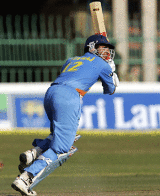After a minor blip at Ahmedabad, caused as much by an excellent innings by Tillakaratne Dilshan as by the dew factor at the Motera, normal order - at least in the context of this series - was restored with yet another one-sided romp. That it was brought about by two players who hadn't contributed much so far in this series made it all the more pleasing for the Indians.
With the matches themselves being so one-sided, much of the attention has been on the Indian think-tank's policy of rotating their players around, allowing the newcomers a chance and the experienced ones a rest. One defeat was all it took for the critics to question the strategy - a 7-0 series scoreline looks much better than a 4-3 one, they argued - and India must do everything to ensure it. A fair point, but it completely overlooks a bigger issue - one that Greg Chappell and Rahul Dravid have repeatedly been stressing - of building a squad for the future. Arjuna Ranatunga might term it cockiness, but foresight and long-term planning are probably much better words to describe what the Indian think-tank has been up to.
Over the next seven months, the Indians will be involved in ten Tests and as many as 36 one-day internationals. You'd have to stretch your imagination to believe that a pool of 13 or 14 players will suffice for all these matches. How often have we seen a team rely on 11 players through a tournament, only for one of their regulars to pull up short on the day of the final? A player with no immediate match practice is brought in, forced to perform in a must-win situation, and invariably pulls up short. India's current approach indicates that they're doing their best to avoid such situations.
Rudra Pratap Singh's superb performance at Rajkot was the perfect vindication of this policy. Brought into the team for the Ahmedabad match, he struggled - as did most of the other bowlers - to come to grips with difficult bowling conditions. But the opportunity to bowl at the Sri Lankan batsmen in a match situation proved invaluable today, when Ajit Agarkar was a last-minute casualty due to illness. Coming in as the first change after S Sreesanth had sprayed it around, RP Singh settled into a rhythm and a perfect line and length from the outset, nailing the fluent Upul Tharanga with a beauty which pitched on a length just outside off and lifted, inducing an edge - in fact, his first over was a wicket-maiden. It's not outrageous to assume that the Ahmedabad experience helped RP Singh settle in quicker than he might have had this been his first game of the series.
Apart from ensuring that a fringe player is match-ready, the rotation policy also ensures that the team has something to gain - apart from seeking a win - from every match. Today, it found just how well RP Singh could cope with a potentially explosive batting line-up on a placid pitch. This policy has also allowed Sreesanth to be given a fair run, and while he didn't enjoy as much success, he too showed the kind of flexibility that has been the mantra for this Indian team, readily changing from over to round the wicket when one line of attack wasn't working. That change of line brought him his only wicket too.
The other big gain for India was Yuvraj Singh's return to form. The last time he played a game in this series, he pottered to 3 off 21 deliveries, struggling to get the ball off the square. Here, he was all timing - the drives were executed with outstanding timing and panache, and with the spectre of Muttiah Muralitharan not looming, the spinners posed him no problems either, as he advanced down the track with complete assurance. This match continued the trend of different players putting their hands up in different games - apart from Virender Sehwag, the specialist batsmen have all played at least one meaningful knock, while the bowlers have all chipped in with crucial breakthroughs. The fielding, despite minor glitches here, was again top notch - the run-out of Dilshan, especially, might have made a difference of about 30 runs to Sri Lanka's total, and once again underlined the importance of fielding in ODIs. It's these aspects that will please Chappell and Dravid as much as the win itself.
If India have many reasons to gloat, then Sri Lanka have plenty of soul-searching to do. The team got off to a superb start, but then threw it away with some shocking shot-selection. Dilshan rode on the confidence that is clearly sky-high after his Ahmedabad exploits, but it's just as clear that it hasn't rubbed off on any of his team-mates. And without Muralitharan, the bowling attack had a completely toothless look to it. Tom Moody and Marvan Atapattu will be hard-pressed to prevent a 6-1 series drubbing.
